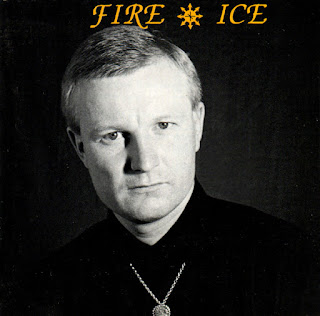Country: Greece
Tracklist
1. Σοφοκλέους Αντιγόνη 01:14:08
Aris Retsos was born in Alexandria, Egypt in 1957 and studied acting at the Veakis School in Athens.
Between 1981 and 1986 he appeared in the films "Oi Apenanti" and "Mania" directed by Giorgos Panousopoulos,
"Bordelo" directed by Nikos Koundouros, "I Fotografia" directed by Nikos Papatakis,
a film considered to be inside the top ten of the Greek cinema,
and in the tv movie "Xoma Kai Nero" directed by Fotis Vianelis.
He became widely known to the public through the part of the consumptive young man Paspatis,
in the television series "Astrofeggia" (1981), based on a novel by I.M.Panagiotopoulos.
In 1986 though, the promising, upcoming young star Aris Retsos,
made a very unusual choice and decided to retire from the movie and theater business.
He became involved in deep and systematic research of the rules and techniques of acting in general,
and with special emphasis given on the Ancient Greek Drama.
At that time, he also started his practice at the martial art of Tai chi.
In 1993, after seven years of retirement, he returns to the theater, with a solo performance entitled "Anoixti Dokimi".
There, in "EMPROS" theater in central Athens, having only one stringed musical instrument accompanying him,
he recites excerpts from the Greek tragedy "Ajax" by Sophocles in ancient Greek and in a way never heard before.
During that performance, it became vividly understood for the first time, that the musical measures, pace and rhythm, define completely not only the way of acting in the Ancient Greek Drama, but also the direction, the choreography etc.
This totally new proposal, after the initial surprise, was very well received by the audience.
The famous Greek composer Manos Xatzidakis, having watched the performance, immediately asked Aris Retsos
to record "Ajax" and publicize it through the avant-garde record company "Seirios" that he managed those days.
In 1994, Aris Retsos chooses for his debut in theater direction
the highly praised contemporary Greek one act play "To Tavli" (The Backgammon) by Dimitris Kexaidis.
In 1995 he founds the theater company "Polionimo" (the one with the many names) and presents in "Sfendoni" theater
the performance "Antigonis Xoros" (chorus of Antigone) based on "Antigone" by Sophocles
and exploring the central part of the "Chorus" in Ancient Greek Drama.
At the same period he released the CD "Σοφοκλέους Αντιγόνη" that features a live recording performance
at "Sfendoni" theater and comes inside a box with a cloth bound book of the performance text.
In 1996 he appears in the international poetry festival "Myrisai To Ariston" (Smell The Excellent),
directed by Maya Liberopoulou, in Herodes Atticus Odeon, with a performance based on "Ajax" by Sophocles.
In 1998 he participates in the international theater festival "The Ancient Drama In The East"
organized by the European Cultural Center of Delphi, with the performance "Antigonis Xoros".
In 1998 he presents the performance "Strofes - Antistrofes" (Verses and Counter-verses) based also on plays by Sophocles.
During this performance, the musical orchestra "Nikos Skalkotas"
played music by Ianis Xenakis under the direction of Miltos Logiadis.
Between 1993 and 2001, Aris Retsos, appeared in many cultural events and festivals all around Greece
and was invited by the German - Greek theater festival of Koln, where he presented the performance "Strofes - Antistrofes".
Since 2001, Aris Retsos has adopted a completely new approach concerning his research of the acting technique.
He has concentrated on the modern Greek language, and has been examining the possibility of transferring
the musical rhythm and measures from the ancient Greek language to the modern,
a transfer which is not academic and arbitrary, but organic and meaningful, and actually raises the quality
and gives answers to the questions of acting in the Ancient Greek Drama and in general.
Based on the knowledge accumulated by this longtime research,
in 2008, he directs and plays in the solo performance "Aima Kako" (Bad Blood),
based on the first chapter of the poem of Arthur Rimbaud "Season In Hell" in a modern Greek language translation.
On the July 5th 2011, invited by the Greek Festival he directs, the performance "Thronos Atreidon"
(The Throne Of The Atreus Family) in Herodes Atticus Odeon, based on excerpts of Sophocles and Aeschylus
relevant to the legend of the Atreus family, in the modern Greek language and with the cooperation of twenty actors.
He is also in charge of the music selection, the scenography, the costumes and the choreography.
In front of a large audience this time, the vast possibilities offered by the musical measures and rhythms
of the plays for the upgrading and evolving of contemporary art, became crystal clear and understood.
In 2013, he directs and appears in the solo performance "Epea Pteroenta" (Words That Fly),
where he recites for the first time ever and in a completely new way, monologues from Aeschylus and Sophocles,
and not only parts of the Chorus as he used to do up to then.















.jpeg)




